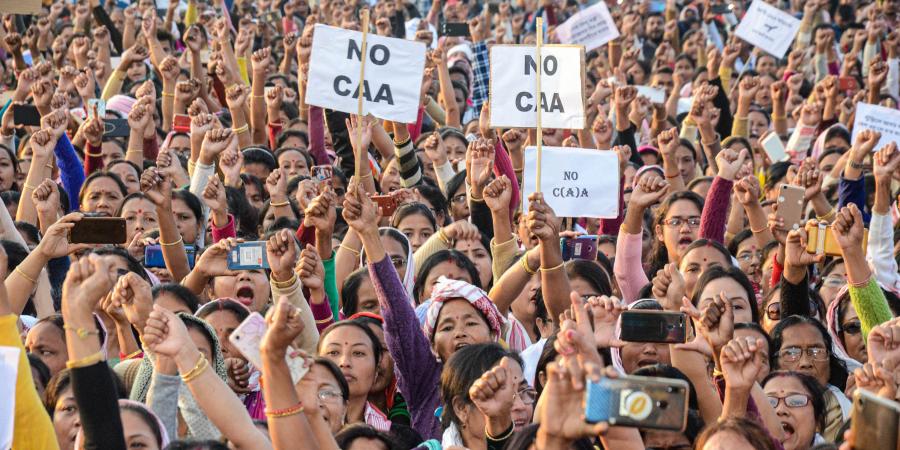
It is particularly distressing that anti-CAA protesters who have been booked under the UAPA and denied bail are all from the minority community and are subject to crowded and unsanitary conditions in the prisons they are held in, said Lawlor | Pic: PTI
Couldn't even recognise my father: Daughter of anti-CAA protester jailed under UAPA

“Can the government compensate my father for the time lost (two years and counting) and my family for our humiliation and unending ordeal,” asked Saima Khan, the daughter of Mohammed Salim Khan, imprisoned under UAPA, after being accused of leading the anti-CAA (Citizenship Amendment Act, 2019) protests.
Saima was one among many participants speaking at a virtual meet for ‘Global Solidarity With Defenders of Indian Constitution’, held to express support for anti-CAA protesters booked under UAPA. The meeting was organised by a host of organisations, including The World Is Watching India and The London Story.
Condemning instances of human rights abuse and police excess, Mary Lawlor, UN Special Rapporteur of Human Rights Defenders (HRD) called for a united pledge to end such unlawful detention and appealed to Indian authorities for the immediate release of the victims.
“It is particularly distressing that anti-CAA protesters who have been booked under the UAPA and denied bail are all from the minority community and are subject to crowded and unsanitary conditions in the prisons they are held in,” added Lawlor.
Saima’s harrowing account
Narrating the ordeal of Khan’s family, Saima said: “When I went to meet my father in prison, I could not recognise him. He looked frail and dejected. Clothes were hanging from his frail body. When I heard him calling out my name, I identified his voice and tears started rolling down my eyes,” said the aspiring dental surgeon who had to leave her medical education to free her father and absolve him of all the charges.
“They have deemed my father anti-national and say that we are a family of terrorists. All he did was run an NGO to help the needy and poor people,” said Saima.
The legal battle
Underscoring the difficulty in finding legal assistance to keep up the fight for over two years, Saima said, “Initially when the protests were covered by the mainstream media, lawyers came forward to represent us. But, as the case dragged on, legal help became scarce and it eventually reached a point where I had to look into all the legal drafting and accompany junior lawyers to sustain our fight.”
Echoing similar concern, Noor Jehan, mother of another accused, Athar Khan, said, “I want to say, proudly, I am an Indian Muslim. It is a matter of pride for me and my son. Our legal fight will continue as securing bail in UAPA cases is extremely difficult. Even then, we believe in India’s judiciary and hope for early closure in the case.”
Unequivocal support
Other speakers included HRD programme director Delphine Reculeau, editor of Maverick Citizen Mark Heywood, Bangladeshi activist Shahidul Alam and former Australian Senator Lee Rhiannon.
Mark Heywood termed the ‘closure of civic spaces’ and growing instances of unlawful detention disturbing. Governments should follow the dictum ‘Rule of law and not Rule by Law’. Acts of retribution should be called out unequivocally no matter where such acts are happening, said Heywood.
Former Australian Senator Lee Rhiannon speaking on behalf of the jailed said:
“If you wonder how a protester or anyone can be detained as a terrorist, it is because the police get away with presenting little genuine evidence to the court and bail is impossible to get.”
Shaheen Bagh protests
Until December 2019, Shaheen Bagh was a lesser-known locality in South Delhi. But, with the passage of CAA on December 11, 2019, it has become synonymous with anti-CAA protests.
The Shaheen Bagh protests were unique not only because they were carried out in a peaceful manner but because they were mainly led by marginalised and economically backward Muslim women, a section of society that is rarely at the forefront of such demonstrations against the state.
Current status of CAA
Almost three years after the Citizenship (Amendment) Act, 2019, was passed by Parliament, the Ministry of Home Affairs (MHA) is yet to notify rules governing the act.
The legislation cannot be implemented without rules being notified. Earlier this year, the MHA was granted extension for the sixth time from the Parliamentary Committees on Subordinate legislation in the Rajya Sabha and the Lok Sabha to frame rules for the controversial CAA, 2019.
Next Story

